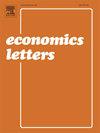部分被动所有权持有破坏稳定的勾结
IF 1.8
4区 经济学
Q2 ECONOMICS
引用次数: 0
摘要
在具有线性需求的同质商品古诺双寡头垄断中,我们证明了只要拥有竞争对手股份的公司的议价能力不太高,部分被动所有权(PPO)持有就会破坏合谋的稳定性。值得注意的是,如果两家公司在谈判中对合谋产生的盈余具有同等的议价能力,那么PPO持有量的增加总是使合谋不那么稳定。我们的研究结果对反垄断当局具有重要的政策意义。本文章由计算机程序翻译,如有差异,请以英文原文为准。
Partial passive ownership holdings destabilizing collusion
In a homogenous good Cournot duopoly with linear demand, we demonstrate that partial passive ownership (PPO) holdings destabilize collusion as long as the bargaining power of the firm that owns stakes in its rival is not too high. Notably, if both firms have equal bargaining power during their negotiations over the surplus generated by collusion, an increase in PPO holdings always makes collusion less stable. Our findings have important policy implications for antitrust authorities.
求助全文
通过发布文献求助,成功后即可免费获取论文全文。
去求助
来源期刊

Economics Letters
ECONOMICS-
CiteScore
3.20
自引率
5.00%
发文量
348
审稿时长
30 days
期刊介绍:
Many economists today are concerned by the proliferation of journals and the concomitant labyrinth of research to be conquered in order to reach the specific information they require. To combat this tendency, Economics Letters has been conceived and designed outside the realm of the traditional economics journal. As a Letters Journal, it consists of concise communications (letters) that provide a means of rapid and efficient dissemination of new results, models and methods in all fields of economic research.
 求助内容:
求助内容: 应助结果提醒方式:
应助结果提醒方式:


